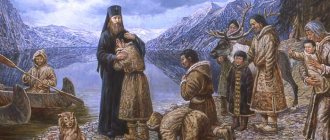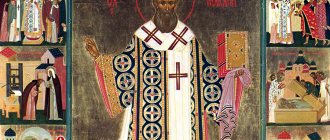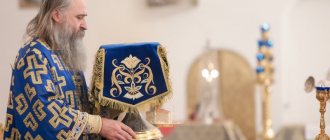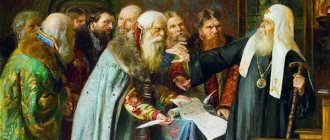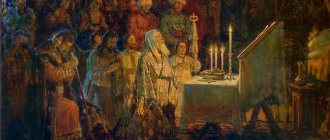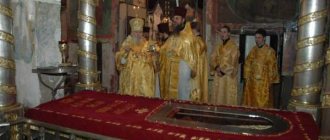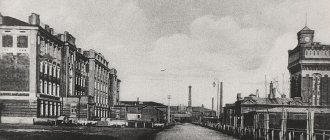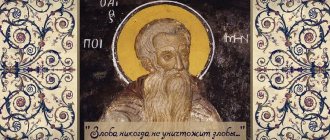Russian Orthodox Church
The future Patriarch Pimen (in the world Sergei Mikhailovich Izvekov) was born on July 10, 1910 in the city of Bogorodsk, Moscow province (according to other sources, in the village of Kobylino, Babichevsky volost, Maloyaroslavets district, Kaluga province) in the family of an employee.
In his adolescence, on holidays and days off from school, he loved to go to church, where he often read and sang in the choir, and also served as a subdeacon with Bishops Nikanor and Platon of Bogorodsk. In 1923, Sergei, who had a wonderful voice, was invited to the cathedral’s bishop’s choir.
In 1925, after graduating from school, he moved to Moscow and at the end of the same year, at the Sretensky Monastery, he was tonsured into the ryassophore with the name Plato. During this period of his life, the monk Plato directed church choirs in Moscow churches.
On October 4, 1927, in the Paraclete (Holy Spirit) desert near the Trinity-Sergius Lavra, the 17-year-old monk Plato was tonsured a monk with the name Pimen in honor of the Venerable Pimen the Great.
On July 16, 1931, Archbishop Philip (Gumilevsky) of Zvenigorod, monk Pimen was ordained a hierodeacon, and in January 1932, a hieromonk. For several years he served as a pastor in Moscow.
In 1932, he was called up for two years of military service in the Red Army in one of the units in Belarus.
According to some information, Hieromonk Pimen did not accept the “Declaration” of Metropolitan Sergius (Stragorodsky) and until 1945 he did not communicate with the structures under the jurisdiction of Metropolitan Sergius.
Accurate information about the life of Hieromonk Pimen in 1932-45. no, there are different versions of his biography. According to one of them, he deserted, lived on false documents in Moscow, was convicted on charges of desertion, and until the fall of 1941 served his sentence on the construction of the Moscow-Volga canal and in exile in the Uzbek SSR. In 1944 he was sentenced to 10 years and served exile in Vorkuta; in 1945 he was amnestied in connection with the victory over Germany. According to another version, in 1934 he was arrested for violating the law on the separation of Church and state and sentenced to three years in prison; served time on the construction of the Moscow-Volga canal in the city of Khimki, Moscow region. After the end of his term in 1937, he was exiled to the city of Andijan, Uzbek SSR, where before the start of the Great Patriotic War he was in charge of a house of health education. In June 1941 he was drafted into the active army.
The end of the Great Patriotic War found Hieromonk Pimen as a priest of the Annunciation Cathedral in Murom. He served in the cathedral until 1946. Then he continued his service in the Odessa diocese as treasurer of the Odessa Elias Monastery, assistant dean of the monasteries of the diocese, taught at the Odessa Theological Seminary, and performed other obediences.
He was soon transferred to the Rostov diocese, where until 1949 he held the position of secretary of the bishop, member of the diocesan council, and keymaster of the Cathedral of the Nativity of the Blessed Virgin Mary.
By decree of His Holiness Patriarch Alexy I in 1949 he was appointed abbot of the Pskov-Pechersky Monastery; in the spring of 1950, Metropolitan Gregory of Leningrad elevated him to the rank of archimandrite.
In 1954-1957 - Viceroy of the Trinity-Sergius Lavra. Just as in the Pechersky Monastery, he carried out major restoration work in the cathedrals here and took care of the improvement of the Lavra.
On November 17, 1957, in the Assumption Cathedral of Odessa, he was consecrated Bishop of Balta, vicar of the Kherson diocese. At the end of the same year, he was appointed Bishop of Dmitrov, vicar of the Moscow diocese.
In July 1960, Bishop Pimen was appointed manager of the affairs of the Moscow Patriarchate, in November he was elevated to the rank of archbishop and introduced to the Holy Synod.
On March 16, 1961, he was appointed to the Tula See, leaving him the post of manager of the affairs of the Moscow Patriarchate. On November 14 of the same year he was appointed Metropolitan of Leningrad and Ladoga.
For the period from 1959 to 1962. Bishop Pimen, along with his main responsibilities, was entrusted with the temporary administration of the Lugansk, Smolensk, Kostroma and Tambov dioceses. Archbishop Pimen was the chairman of the Economic Administration of the Moscow Patriarchate, rector of the Moscow Epiphany Cathedral. In October 1963 he became Metropolitan of Krutitsky and Kolomna.
After the death of Patriarch Alexy I in 1970, Metropolitan Pimen of Krutitsky and Kolomna, in accordance with the “Regulations on the Administration of the Russian Orthodox Church,” assumed the position of Patriarchal Locum Tenens.
On May 30, 1971, the Local Council opened. On June 2, on the final day of the Council, Metropolitan Pimen was unanimously elected Patriarch of Moscow and All Rus' by open vote. The enthronement took place the next day, June 3, at the Epiphany Cathedral in Elokhov, Moscow.
Patriarch Pimen showed tireless concern for theological schools and church publishing activities. Temples and monasteries were improved and opened. The service of the First Hierarch was dedicated to the defense of the Church of Christ, the ancient traditions of monastic life, and the expansion of the influence of Orthodox culture in Russia and in the world. One of the most important aspects of the activities of Patriarch Pimen, which began from the very first days of the Patriarchate, was the strengthening of relations between the Orthodox Churches of different countries. Numerous visits of His Holiness Patriarch Pimen and his fraternal meetings both abroad and at home with the Primates of the Orthodox and other Christian Churches, as well as with prominent government and public figures from various countries, served for the benefit of Holy Orthodoxy.
During the years of the First Hierarchal ministry of His Holiness Patriarch Pimen, Russia experienced serious historical changes. In June 1988, His Holiness Patriarch Pimen led the celebrations dedicated to the 1000th anniversary of the Baptism of Rus' and the Local Council of the Russian Orthodox Church. More active participation of religious figures in the life of society became possible, and in 1989 Patriarch Pimen was elected as a people's deputy.
The Primate took part in the celebration of the 400th anniversary of the establishment of the Patriarchate in Rus', visiting the Assumption Cathedral of the Moscow Kremlin in the fall of 1989 and performing a memorial service at the tombs of the Russian Patriarchs and a prayer service to the newly glorified saints Job and Tikhon. After a long break, believers could openly pray in the main cathedral of the Russian Church and venerate the relics of the saints.
He died on May 3, 1990, at the age of 80, and was buried in the crypt of the Assumption Cathedral of the Trinity-Sergius Lavra near the grave of his predecessor, Patriarch Alexy I.
***
His Holiness Patriarch of Moscow and All Rus' Pimen: on the centenary of his birth and the twentieth anniversary of his blessed death
Lord Order Bearer
At the same time, the country entered a period of peace: people, tired of the great upheavals, could live, planning their future for years to come. Relations between church and state, which experienced another acute phase during the reign of Nikita Khrushchev . Soviet General Secretary Leonid Brezhnev did not question the secular status of the state with a bias towards atheism, but they began to look at those who regularly attended church much more calmly. The Russian Orthodox Church, having found its niche in society, actively collaborated with the authorities, without questioning its supremacy. In return, Soviet leaders encouraged the ROC to expand its international relations.
In 1980, when the Summer Olympics were held in Moscow, the Patriarch of Moscow and All Rus' visited the arena in Luzhniki, the Olympic village, and also attended the closing ceremony of the Games, together with everyone watching a bear cub fly away into the Moscow sky. The authorities were sure that the head of the church would not allow himself anything unnecessary. It was not for nothing that by that time he was awarded the Order of the Red Banner of Labor and Friendship of Peoples.
Divine service during the enthronement of Patriarch Pimen in the Epiphany Cathedral in Moscow. 06/03/1971. Photo: RIA Novosti/L. Nosov.
Canal Army soldier, sanitary inspector, head teacher
In 1937, during the “Great Terror”, Pimen was arrested again and sent to forced labor on the construction of the Moscow-Volga canal. For many, the end of construction became the day of liberation, but Pimen was among those who were assigned a new place to serve his sentence: Uzbekistan. In Andijan they appreciated the good education that the disgraced monk had, and soon Comrade Izvekov became a sanitary inspector for the quality of public catering. A little later, he was appointed head of the regional House of Health Education, thanks to which he was again able to visit Moscow, where he went to a conference of health education workers.
In 1940, Sergei Izvekov entered the literary department of the Andijan Evening Pedagogical Institute. From health education he moved to regular education, becoming the head teacher of school No. 1 in Andijan. Perhaps Izvekov would gradually become an honored teacher, but the beginning of the Great Patriotic War again changed his fate. In August 1941 he was called up for service.
Hero and Deserter
One can get confused in hypotheses about the military fate of the future patriarch: here you have both heroic epics and stories about desertion for reasons of principle. But the most plausible and confirmed by facts is the one according to which Izvekov, who had an education, was sent to accelerated officer courses, after which he received the rank of junior lieutenant and the position of platoon commander. In March 1942, he was appointed assistant chief of staff for logistics of the 519th Infantry Regiment, which was in the reserve of the Headquarters of the Supreme High Command. In May, part of Izvekov was transferred to the front. He took part in heavy battles, was surrounded, was shell-shocked, but returned to duty.
Senior Lieutenant of the Red Army S. M. Izvekov. Photo: Commons.wikimedia.org
In August 1943, already a senior lieutenant and company commander, Izvekov went missing near Kharkov. And he was found in November 1944 in Moscow, on Sushchevsky Val. People close to Pimen explain it this way: near Kharkov, he was wounded, sent to the hospital, after which, having learned about the change in the attitude of the authorities towards the church, he decided not to return to the front. For such self-will, Izvekov was sent to a tribunal, which sentenced him to 10 years in the camps.
The quiet creator of big things
Alexy died in the spring of 1970, and on June 2, 1971, at the Local Council of the Russian Orthodox Church, Pimen was unanimously elected Patriarch of Moscow and All Rus'.
From the point of view of the authorities, he was the correct head of the church: he denounced the imperialists, supported the peaceful construction of socialism, and spoke out in defense of the victims of racial intolerance. Loyalty allowed Pimen to strengthen the position of the Russian Orthodox Church within the USSR, as well as to conduct active international activities, which the Soviet leadership saw as part of the general foreign policy course.
They say that company commander Izvekov at the front was ready to expose himself to bullets rather than risk people once again. Having become a patriarch, Pimen behaved the same way: showing loyalty to the authorities, he tried to preserve his flock and carefully expand opportunities. Thanks to this, Pimen was able to resolve issues that people were afraid to raise before him. It was he who achieved the transfer of the Danilov Monastery complex to the creation of the administrative center of the Moscow Patriarchate. At the same time, it was allowed to create a monastic community, which in 1983 seemed like a revolutionary event.
Autumn of the Patriarchs. The worst films of outstanding domestic directors Read more
Other times
The Patriarch considered aggressive missionary activity unacceptable, believing that it would rather alienate and frighten people than attract them. Perestroika and changes in the relationship between church and state created new opportunities for the Russian Orthodox Church, but Pimen could hardly imagine that this new freedom of conscience would result in churches supported by organized crime groups, a car consecration business, churches “within walking distance,” etc.
The big celebrations in 1988, dedicated to the millennium of the baptism of Rus', became Pimen’s last big undertaking. He was already very ill, although he tried to fulfill his duties until his last days. The Patriarch passed away in May 1990. A new time was dawning in the life of the church and country. There was a lot to it. There was only no peace and stability, which Pimen valued so much.
Childhood
Sergei Mikhailovich Izvekov was born in 1910 in Kobylino. The child was baptized in the church of the neighboring village of Glukhovo, which is sometimes mistakenly considered the small homeland of the patriarch, and his own sister became his godmother. As children, children and their mother often made pilgrimages to holy places, during which they met famous elders of that time. As a teenager, Sergei began traveling to monasteries alone or with friends. As indicated in his official biography, when the future Patriarch of All Rus' Pimen arrived at the famous St. Diveyevo convent for a pilgrimage, Blessed Mary, who lived there, called the young man a bishop and demanded that his shoes be placed separately to dry.
Biography after 1946
After recovery, in March 1946, Patriarch Pimen, whose biography has not yet been fully researched, was appointed to the clergy of the Murom Annunciation Cathedral, and a year later he was elevated to the rank of abbot. Memories of people from his inner circle have been preserved, testifying to the torment that he experienced while conducting services, as he was forced to wear a corset due to a sore spine.
In 1954, the Holy Synod of the Russian Orthodox Church decided to proclaim Pimen Bishop of Balta. Subsequently, he also held important positions, including in the Moscow Patriarchate.
